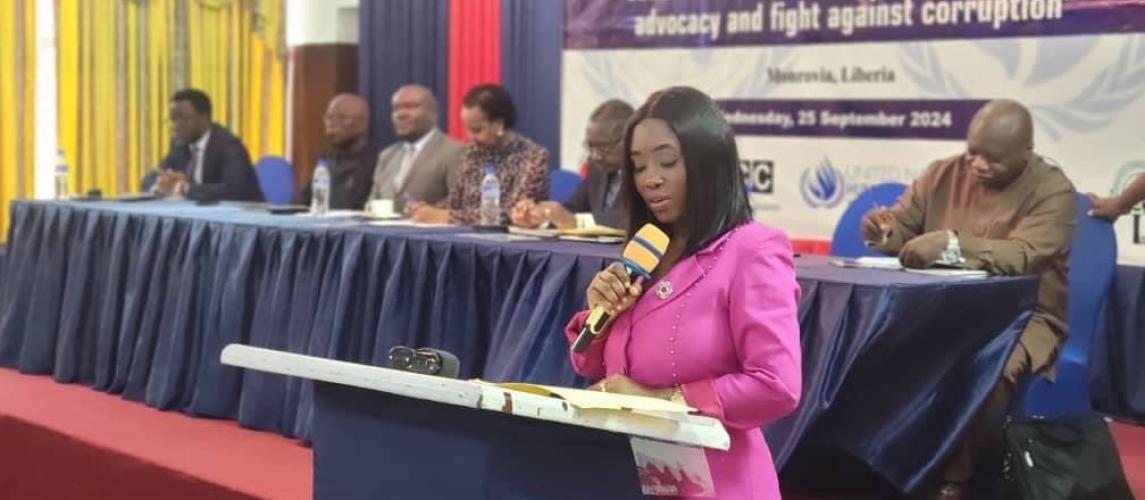
Joint Official Press Release (OHCHR, LACC & INCHR)
OHCHR concluded a one-day regional dialogue on 25 September with recommendations for effective independence, collaboration, accountability, capacity building, and the setting up of regional networks of anti-corruption institutions, human rights commissions, and civil society organizations in Liberia, Sierra Leone, and beyond.
Welcoming the participants, OHCHR's Representative in Liberia, Christian Mukosa, stated that the focus of the Dialogue, among other things, was to put in place strategies on how corruption's adverse effects on the enjoyment of human rights can be addressed collaboratively and to " seek opinions and best practices to have human rights and anti-corruption institutions actively participating in accountability mechanisms."
UN Resident Coordinator Christine Umutoni commended OHCHR and other UN agencies for supporting the initiative, emphasizing the connection between corruption and human rights. "Therefore, strengthening national institutions and regional mechanisms is key to providing redress for victims and accountability for human rights violations, including economic and social rights," she stressed.
In his keynote address, the Liberia Minister of Justice and Attorney General, Cllr. N. Oswald Tweh described the Dialogue as timely, allowing the two countries to exchange best practices and experiences. He pointed out that this was fundamental to empowering them to fight corruption and human rights, including enhancing advocacy on these critical issues. He concluded that "together we can forge a future in which the rights of every individual are fiercely protected and where corruption is not merely challenged but eradicated".
Liberia Anti-corruption Commission’s Executive Chairperson, Cllr. Alexandra Zoe, emphasized the need for an alignment of policies with international standards, strengthening the regional framework that 'binds us,' she noted.
Sierra Leone's Deputy Anti-Corruption Commissioner, Augustine Ngobie, expressed his Commission's readiness to support the Liberian counterparts in enhancing its international standing in the fight against corruption.
Victor Idrissa Lansana, Esq., Vice Chair of the Sierra Leone Human Rights Commission, stressed the crucial importance of human rights and urged OHCHR to expedite the establishment of a regional network. This network would significantly strengthen advocacy efforts and accountability in protecting human rights and fighting corruption and facilitate cross-border initiatives.
The Chairperson of the Liberia Independent National Commission on Human Rights, Cllr. T. Dempster Brown encouraged his colleagues and the government to intensify their efforts in fighting corruption and human rights violations. He also referenced the debate for establishing the War and Economic Crimes Courts in Liberia, reiterating the need for such to be established for justice to prevail.
The Dialogue followed a one-week OHCHR-supported exchange visit to Sierra Leone conducted in May 2024 and co-led by the Chairs of the Liberia Anti-Corruption Commission (LACC) and the Independent National Commission on Human Rights (INCHR) of Liberia. In addition to information about the then Special Court for Sierra Leone and its residual mechanism and the ongoing work of the anti-corruption court in Sierra Leone , participants learned about the role of these integrity institutions in supporting accountability processes.
The organization of the One-Day Dialogue in Monrovia was one of the recommendations from that fruitful visit.
It is hoped that the lessons learned from the Dialogue will support the creation of a clear bridge between the two countries' Human Rights and Anti-Corruption Institutions, enhance the exchange of best practices and experiences, and lay the foundation for stronger cross-border collaboration.
"OHCHR will compile the outcomes of the recommendations, which will serve as the foundation for the next steps in our collective fight against corruption and in upholding human rights," said Christian Mukosa at the end of this important meeting. This commitment is a testament to the determination and resolve of the participating institutions.
In addition to Commissioners and staff from the anti-corruption commissions and human rights commissions from both Liberia and Sierra Leone, other participants included members of the diplomatic corps, representatives of government entities and commissions, heads of UN agencies, lawyers, members of civil society organizations, and media practitioners.
